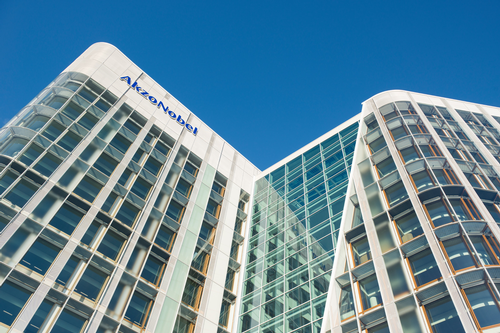MONDAY, NOVEMBER 28, 2022
The Competition Commission has recently denied global coatings company AkzoNobel’s proposal to merge with African coatings company Kansai Paint to acquire its paints and coatings activities in the region.
The Competition Commission is a statutory body constituted in terms of the Competition Act, No 89 of 1998 by the Government of South Africa empowered to investigate, control and evaluate restrictive business practices, abuse of dominant positions and mergers in order to achieve equity and efficiency in the South African economy.
About the Proposed Merger
In June, AkzoNobel announced that it had reached an agreement with Kansai Paint to acquire its paints and coatings activities in the region.
Present in 12 countries in Africa, Kansai Paint has regional consolidated revenue of around 280 million euros ($300.8 million). Alongside AkzoNobel’s existing Dulux brand, the two are reported to be the longest-established paint brands in the region.

 |
| AkzoNobel |
|
The Competition Commission has recently denied global coatings company AkzoNobel’s proposal to merge with African coatings company Kansai Paint to acquire its paints and coatings activities in the region. |
According to AkzoNobel, the transaction would include the Plascon brand—which has more than 100 years of heritage in South Africa—in addition to various automotive, protective, coil and wood coatings.
“Acquiring Kansai Paint’s activities in the region will help us to further expand our paints and coatings business in Africa and provide a strong platform for future growth,” said AkzoNobel CEO, Thierry Vanlancker, at the time. “Kansai Paint shares our commitment to innovation and sustainability, and we look forward to combining our expertise, which will result in a wider range of innovative products and more sustainable solutions for our customers.”
Kansai Paint’s President Kunishi Mori added, “We are convinced that AkzoNobel is the best owner as AkzoNobel considers the decorative paints business as a core business and will therefore be able to unlock the full potential of the business, thereby contributing to the development of the African economy.
“For Prejay Lalla and Arvind Shekhawat, Chief Executive Officers of KPAL and KPEA (the respective Africa entities being sold by Kansai Paint in this transaction), this agreement is an opportunity to further enhance growth. We believe that AkzoNobel will be the owner who will elevate the business to the next level as AkzoNobel is willing to invest in ESG, is committed to innovation, workforce development and broader career opportunities, as well as the long-term success of its paint businesses in Africa.”
Also commenting on the deal, Jan-Piet van Kesteren, Managing Director of AkzoNobel’s Decorative Paints Europe, Middle East and Africa Business said, “Kansai Paint Africa is a beautiful addition to our existing strong business, which spans across nine countries in the region. The acquisition will complement our portfolio of leading positions in attractive markets and world class brands in Africa, while driving growth in relevant emerging markets. It also offers us the unique opportunity to welcome another strong brand with a heritage of more than 100 years and a wide distribution network.”
Completion, which was subject to regulatory approvals, was expected sometime in 2023.
Prohibited Merger
The Competition Commission recently announced that it has prohibited AkzoNobel’s acquisition of Kansai Plascon Africa Ltd and Kansai Plascon East Africa Ltd.
In South Africa, it is known that AkzoNobel controls the Akzo Nobel Powder Coatings South Africa; Akzo Nobel South Africa Ltd; ICI Dulux Ltd; and P J A Ltd. In addition, AkzoNobel manufactures Dulux-branded paint products which are used in various segments, primarily divided into decorative and industrial coatings.
As the manufacturer of these coatings, AkzoNobel is reported to have three manufacturing plants in South Africa alone—two located in Gauteng (in Alberton and Vanderbijlpark) and one, its largest, in Kwa Zulu Natal (in Umbogintwini). Products manufactured in these plants are sold within the country and are also reportedly exported to other countries in Africa.
Kansai Plascon Africa Ltd and Kansai Plascon East Africa Ltd are controlled by Kansai Paint Co. Limited and are noted to operate under the law of the Republic of South Africa and the laws of Mauritius, respectfully. In South Africa, both firms operate through Kansai Plascon Africa Ltd which manufactures Plascon-branded decorative coatings and industrial coatings.
According to reports, decorative coatings contribute the largest portion to net sales within Kansai Plascon Africa Ltd. In total, the entities have four manufacturing plants—two located in Gauteng (Krugersdorp and Clayville), one in Kwa-Zulu Natal (Mobeni), and one in the Eastern Cape (Gqeberha).
Outside of the country, they are noted to have four additional manufacturing plants—one in Malawi, one in Zambia, and two in Zimbabwe. In its report, the Commission also pointed out that Kansai Plascon Africa Ltd manufactures colorants.
As the largest and second-largest manufacturers of decorative coatings, if these companies were to merge with AkzoNobel, the Commission found that the result would be a substantial lessening of competition in the market for the manufacturing and supply of decorative coatings.
The Commission also found that the merging parties are close competitors in terms of price, quality, and product range and the merger would remove competitive rivalry between two notable brands, thus reducing consumer choice.
Furthermore, the Commission shared that the proposed merger was likely to result in substantial input foreclosure concerns relating to the manufacturing and supply of colorants as the merging parties have both the ability and incentives to foreclose some of their competitors’ access to colorants.
Due to these findings and the lack of evidence of merger-specific technological, efficiency, or another pro-competitive gain that will be greater than and offset the effects of the prevention or lessening of competition submitted by either entity, the Commission has since prohibited the deal from moving forward.
Tagged categories: Acquisitions; AkzoNobel; Business management; Business matters; Business operations; Competition Commission; Dulux; Good Technical Practice; Kansai Paint; Mergers; Program/Project Management; Project Management